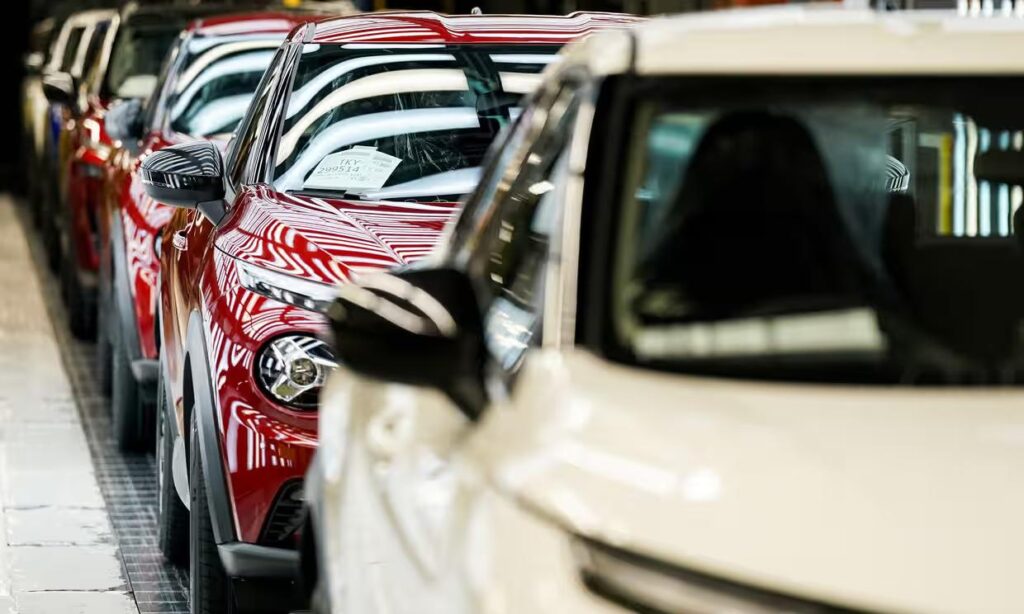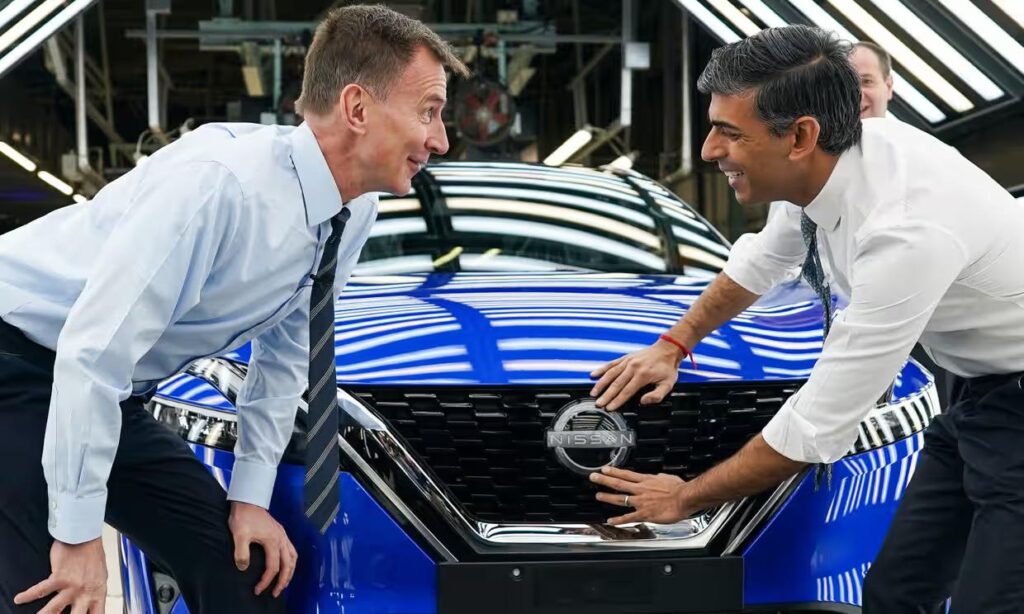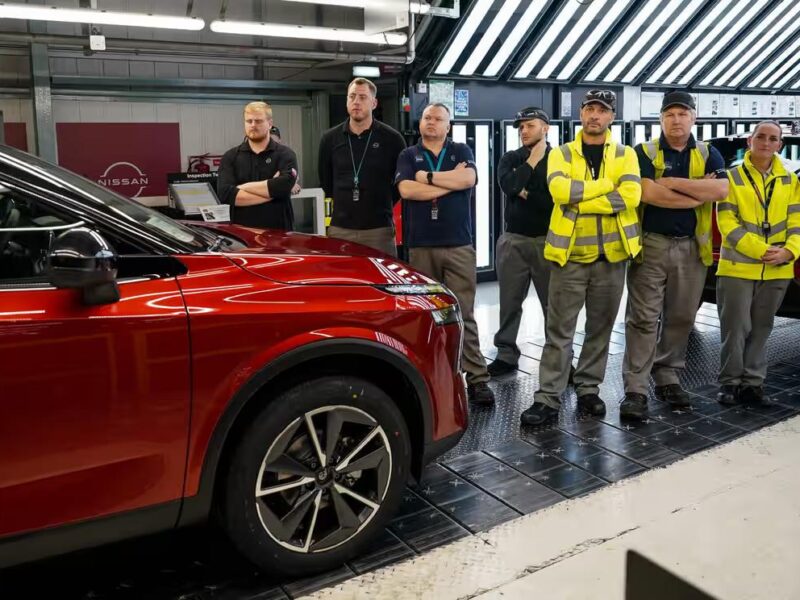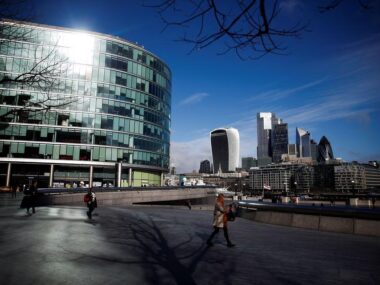Automaker verifies all £2 billion of investment information, including battery factories
As part of a £2 billion investment spearheaded by the Japanese automaker, Nissan plans to construct three new electric car models at its Sunderland facility. The UK government and industry applaud this decision.
The factory will make three different models—which we haven’t named yet—and it will be necessary to build a third “gigafactory” in order to supply batteries for the three models now in production and the one that is being built close to the plant. AESC, a battery business owned by Chinese investors, is in talks with Nissan to construct a third gigafactory close by.
Nissan announced that, in addition to the £1 billion previously promised, the overall investment in the Sunderland region, including the battery plants, will approach £3 billion. In the most recent phase, Nissan will invest £1.1 billion; the remaining £2 billion is anticipated to come from the battery provider after it is verified.
Nissan did not disclose the amount of government funding it received for its investment, although there have been talks for a sizable amount of cash in exchange for guarantees that battery manufacturing will continue in the UK.

The Qashqai and smaller Juke crossover utility vehicles, as well as the Leaf, an innovative electric vehicle that was thought to be nearing the end of its useful life, will be replaced by the new vehicles at the facility. While the replacement for the Leaf will be a smaller compact car, two of the new vehicles will also be crossovers, which blend sport utility vehicle (SUV) style with a more conventional car body structure.
The news on Friday morning follows this week’s leak of blueprints, which suggested Nissan had chosen to move forward with replacing its Qashqai and Juke models at the facility in northeast England.
The news solidifies Sunderland’s standing as the biggest electric vehicle manufacturing in the United Kingdom and will provide its 6,000 employees with a pivotal role in the future of the automotive sector in the United Kingdom. The investment, according to Rishi Sunak, is a “massive vote of confidence in the UK’s automotive industry.”
After mentioning Nissan during Wednesday’s autumn statement, the prime minister and chancellor, Jeremy Hunt, visited the plant on Friday and spoke with Makoto Uchida, the CEO of Nissan.
Following the Brexit vote in 2016 and the coronavirus epidemic, which disrupted global semiconductor computer chip supplies, the UK’s automobile industry faced uncertainty. It has, meanwhile, done better in recent months thanks to investment pledges from Germany’s BMW and India’s Tata, which will improve their factories to produce electric Mini cars and create a £4 billion battery factory to supply JLR, the company that makes Jaguar and Land Rover.
Though they lack internal combustion engine types and have more modern appearances, the three new models will essentially match the three current models. Representing one in five of all cars made in the UK, the Qashqai was the bestselling vehicle in the UK in 2022.

AESC’s plant next to the automobile produces batteries with an annual capacity of 1.8 gigawatt hours (GWh). The nearby 9GWh-capable second site is already being constructed by the Chinese-owned business.
The third phase of AESC’s planning is well underway, and the company has already stated that it may achieve 35GWh of yearly capacity, or the highest output that the Sunderland plant is capable of producing, or about 600,000 automobiles.
Senior Nissan official Alan Johnson, who oversees supply chains, stated that while conversations were still in progress, “it would make a lot of sense” for AESC to construct the third gigafactory.
According to Nissan’s Uchida, Sunak and he talked about how to maintain the UK industry’s competitiveness versus other nations in the face of competition from China’s rapidly expanding electric vehicle market.
“Our Sunderland plant, Britain’s biggest ever car factory, is at the heart of our future vision,” according to Uchida, who added that by 2030, all cars sold in Europe will be electric.
Nissan stated that it will invest £1.1 billion on the manufacturing, the larger supply chain, employee training, and the advancement of electric technology. In order to supply the factories with 100% renewable energy and produce electric cars and batteries with no carbon footprint, it will also incorporate wind and solar power generation.
Uchida refuted claims that the switch to electric cars would inevitably result in job losses in the future due to increased automation. In order to increase production efficiency, the business planned to produce additional parts in the UK in the future, such as electric powertrains.
He remarked, “It doesn’t mean we don’t need a workforce if we transform to EV.” The company also wants more UK-based suppliers since, “otherwise you will not be able to reach that level on cost.”
According to Sunak, Nissan’s investment is a huge endorsement of the UK car industry, which already makes up a sizable £71 billion annual contribution to the country’s GDP. Without a doubt, this project will ensure Sunderland’s status as the UK’s Silicon Valley for the development and production of electric vehicles.
The northeast of England now has investment zone designation from the UK government, which offers tax benefits to firms along with a modest amount of grant support.











